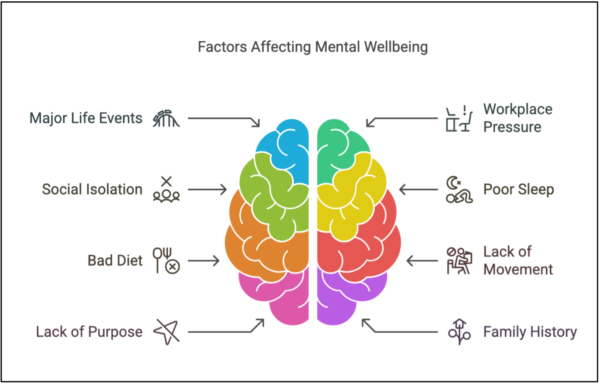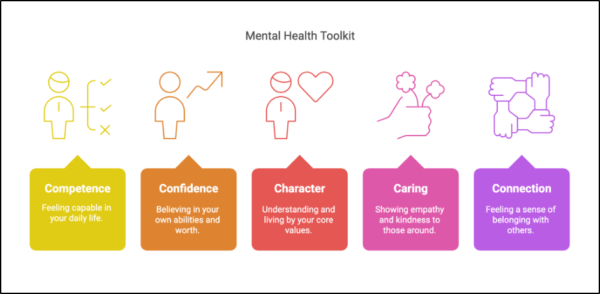Mental health challenges affect many Australians. According to the National Study of Mental Health and Wellbeing (2020-2022), approximately 43% of Australians aged 16 to 85 have experienced a mental disorder at some point in their lives, and about 22% have experienced one in the past year.
As a Clinical Psychotherapist and Accredited Mental Health Social Worker, I’ve supported individuals from all walks of life who are trying to manage their mental well-being amongst life’s demands. Whether you’re grappling with stress related to your career, personal relationships, health concerns, or life’s myriad pressures, it’s important to know that you are not alone.
The good news is that you can take practical, manageable steps to improve your mental health and strengthen your sense of balance, purpose, and joy.
What Exactly is Mental Well-being?
Mental well-being isn’t simply the absence of mental illness—it’s about being emotionally balanced, resilient and genuinely connected to yourself and others. It’s how effectively we can manage stress, enjoy life’s small pleasures and sustain meaningful relationships.
Take a moment to think about those small, delightful moments: savouring your morning coffee or laughing with friends. These simple pleasures can significantly influence your mental wellness.
When you’re feeling mentally well, you become more present, more adaptable and better equipped to navigate life’s inevitable ups and downs.
Why is Mental Health Important?
Let’s address the reality.
In 2022, a majority of Australians (64%) rated their stress levels at 5 out of 10, or higher, meaning most people experience moderate to high stress levels.
When you have good mental health, life tends to feel more manageable – relationships are easier, work is more enjoyable and caring for yourself is like second nature. Good mental health enables us to handles stress, make better decisions, maintain physical health and form positive relationships.
Dealing with mental health issues, however, takes a toll on your entire wellbeing. Emotional difficulties, impaired physical health, social isolation and an overall lower quality of life can be experienced when mental health is neglected.
What is Search-Listening Research?
To better understand the needs of people today, mental health professionals often draw on insights from search-listening research – a method of analysing online search patterns to uncover common struggles and concerns that people face. This research often highlights anxiety, burnout and loneliness as prevalent issues. By acknowledging and normalising these issues, we, as mental health professionals, can better support individuals and provide targeted strategies to enhance overall wellbeing.

What Influences Your Mental Wellbeing?
There are many things that can shape our mental state—some are within our control and others are not.
Through many years of practice, I’ve observed common influences, including:
● Major life events – (loss, trauma, relationship breakdowns)
● Workplace pressure or burnout
● Social isolation
● Poor sleep
● Bad diet
● Lack of physical activity/movement
● Lack of purpose or direction
● Family history of mental illness or neurodivergence
Notably, financial stress is a big concern with nearly half of Australians reporting that financial pressures caused them distress in the past year.
Identifying which of these is or might affect you is a powerful first step towards improving your mental health.
Introducing the 5 C’s of Mental Health
The following five core elements are essential to mental wellness.
Competence – Feeling capable
Confidence – Believing in your abilities
Character – Knowing and living by your values
Caring – Showing kindness and compassion
Connection – Cultivating meaningful relationships
Tip: Try practising one ‘C’ every day. Offer help (Caring), reconnect with a friend (Connection), learn something new (Competence), celebrate your strengths (Confidence) or reflect on your values (Character).

How to Improve Your Mental Wellness: 10 Simple, Yet Effective Lifestyle Changes

Small, consistent changes can have a powerful effect on your mental health. Here are ten practical tips that I frequently share with my clients.
1. Movement
Movement doesn’t need to be intense. A simple walk, yoga session, or dancing can help release tension and elevate your mood.
2. Practice mindfulness
Mindfulness exercises, including meditation and deep, focused breathing reduces stress and improves emotional regulation. Incorporating even a few minutes of mindfulness into your daily routine can have huge benefits for your mental wellbeing.
3. Connect with others
Human connection is vital for mental health. Catching up with loved ones or participating in group activities can foster a sense of belonging and reduce feelings of loneliness.
4. Limit media overload
Pay attention to how the news or social media affects your mental state. Excessive consumption of the news or Instagram can lead to increased stress and anxiety. Taking regular breaks to disconnect is incredibly important.
5. Get enough quality sleep
Getting enough sleep is essential for emotional regulation. Aim for 7–9 hours and try to keep a consistent sleep-wake schedule.
6. Eat nourishing foods
A balanced diet helps support brain function and emotional regulation. Getting adequate fruits, vegetables, whole grains and lean proteins can positively impact mood and energy levels. Research from Australia’s Food & Mood Centre indicates that healthier eating habits can result in a 30% reduced risk of depression.
7. Create a routine
Having a daily routine provides structure and a sense of control, which can be comforting during uncertain times. Even a loose plan for the day can help reduce stress and improve focus.
8. Do something that brings joy
Read, paint, garden, cook—whatever makes you happy. Joyful activities can be grounding and help you reconnect with yourself.
9. Journal or write things down
Putting thoughts to paper can reduce mental clutter, help you gain perspective, and track what’s helping or harming your well-being.
10. Seek support early
Accessing mental health support early can prevent issues from escalating. Seeking professional help is a proactive step towards maintaining mental wellness.
Keeping on Top of Your Mental Health
Your mental health, like physical fitness, requires regular care and gentle maintenance. There will always be good days and challenging ones—but every small step you take makes a difference.
Regularly check in with yourself:
- How am I feeling today?
- What do I need right now?
Take the First Step Towards Mental Wellness
If you’re feeling stressed, disconnected, depressed or simply lost—please know that help is available. Connect with a mental health professional, they offer confidential, compassionate care tailored to your unique needs and life circumstances.
Taking the first step can feel daunting—but it’s often the beginning of something truly transformative.
You deserve to feel hopeful, supported and fully connected to your life again.
Adam Szmerling
Born and raised in Melbourne, Adam Szmerling is an Accredited Mental Health Social Worker (AASW) and Psychotherapist (PACFA) with over 20 years of experience. He is the owner of Bayside Psychotherapy which offers online and face to face sessions to individuals and couples who need counselling and psychotherapy through its team of therapists.





